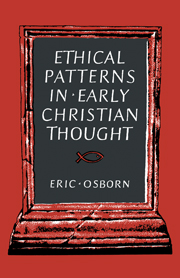
-
Select format
-
- Publisher:
- Cambridge University Press
- Publication date:
- November 2009
- January 1976
- ISBN:
- 9780511557484
- 9780521092913
- Dimensions:
- Weight & Pages:
- Dimensions:
- (216 x 140 mm)
- Weight & Pages:
- 0.34kg, 268 Pages
- Subjects:
- Classical Studies, Religious Ethics, Ancient Philosophy, Religion
You may already have access via personal or institutional login- Subjects:
- Classical Studies, Religious Ethics, Ancient Philosophy, Religion
Book description
In so-called Christian countries an increasing number of people openly reject Christian morality. It is a commonplace that they do this for values that can be shown to be Christian. How did this state of affairs come about? An examination of the beginning of Christian ethical thought shows that, within great personal variety, certain patterns or concepts remain constant. Righteousness, discipleship, faith and love are traced in this book from the New Testament through to Augustine. There is a necessary tension between high ideals and practical performance, or between perfection and contingency. When this tension is lost, Christian ethics can easily go wrong. The amoral perfectionism of second-century Gnostics is remarkably similar to the mysticism of communal movements; the opposite threat of legalism has always been present in conservative forms of Christianity. Dr Osborn is concerned to explain rather than to defend, to look at the way conclusions are reached, and to show the rich diversity of early Christian thought. Successive chapters deal with the New Testament, Clement of Alexandria, Basil the Great, John Chrysostom and Augustine.
Contents
Metrics
Full text views
Full text views help Loading metrics...
Loading metrics...
* Views captured on Cambridge Core between #date#. This data will be updated every 24 hours.
Usage data cannot currently be displayed.
Accessibility standard: Unknown
Why this information is here
This section outlines the accessibility features of this content - including support for screen readers, full keyboard navigation and high-contrast display options. This may not be relevant for you.
Accessibility Information
Accessibility compliance for the PDF of this book is currently unknown and may be updated in the future.


